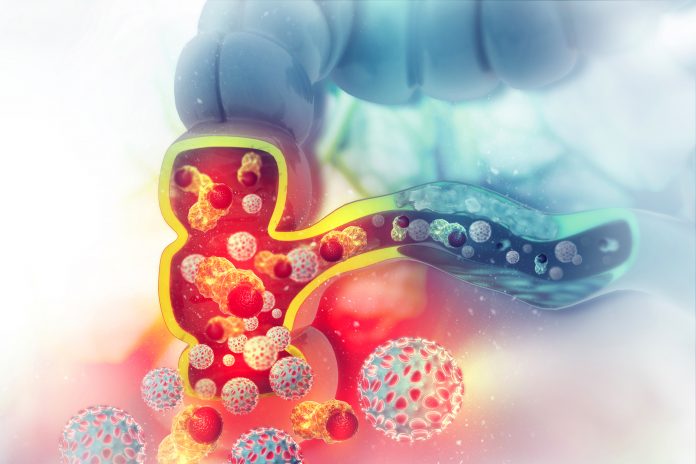
New research has linked significant variations in the gut microbiome to pre-cancerous colonic lesions, according to findings presented at UEG Week 2023. The data points to ways of detecting and treating colon cancer.
The large-scale prospective study, involving 8,208 participants, used data from the Dutch Microbiome Project with the Dutch nationwide pathology database to identify all recorded cases in that country of colonic biopsies from the last five decades.
Researchers analyzed the function and composition of the gut microbiomes of individuals who developed pre-cancerous colorectal lesions before fecal sampling between 2000 and 2015 (n=214), as well as those who developed lesions after fecal sampling between 2015 and 2022 (n=305). These groups were then compared with individuals with normal colonoscopy findings (n=202) and the general population. The researchers also examined specific bacterial strains and their functions within the gut by reconstructing their genomes from metagenomic data.
“We sampled all participants once (in ~2015) and then looked at when the participants developed polyps or CRC in relation to the time of sampling,” Ranko Gacesa, PhD tells Inside Precision Medicine. Gacesa is from the University Medical Center Groningen and the study’s lead author.
Individuals who developed colonic lesions after fecal sampling exhibited increased diversity in their gut microbiome compared with those who did not develop lesions. Moreover, the composition and function of the microbiome differed among individuals with pre-existing or future lesions and varied based on the type of lesion.
Notably, bacterial species from the family of Lachnospiraceae and the genera Roseburia and Eubacterium were linked with the future development of lesions.
“Bacteria genera Roseburia and Eubacterium and some members of family Lachospiraceae bacteria are known to break down fiber and produce short-chain fatty acids (most well-known for being butyrate) which are considered to be beneficial to gut health,” Gacesa says. “While they are often considered to be protective against colorectal cancer, studies are mixed on some of these bacteria. For example, some Eubacteria—such as E. rectalis were also found to be increased in cancer samples.”
Gacesa, adds, “While we didn’t investigate mechanisms in this study, it is known from previous research that some of the bacterial species identified may have properties that could contribute to the development of colorectal lesions. A bacterium called Bacteroides fragilis, for example, is known to produce a toxin that can lead to chronic low-grade inflammation in the gut. Prolonged inflammation is believed to be potentially genotoxic and carcinogenic, meaning it may cause genetic damage and promote cancer.”
Colorectal cancer is the second most prevalent cancer and second leading cause of cancer-related death. It typically develops from pre-cancerous lesions within the gut, making the removal of these lesions an effective strategy for preventing colorectal cancer. However, existing non-invasive detection methods, such as the fecal immunochemical test, produce a high number of false positives, leading to unnecessary colonoscopies.
“The connection between the gut microbiome and pre-cancerous lesions has been underexplored, leaving uncertainty about whether gut bacteria can predict the future onset of colorectal cancer. Our findings suggest that the microbiome could act as a valuable tool to improve existing tests, advancing early detection methods for pre-cancerous lesions and colorectal cancer,” Gacesa concludes.













